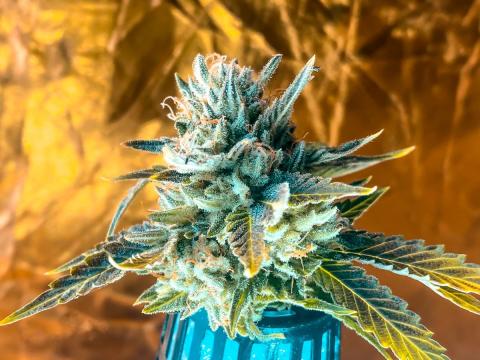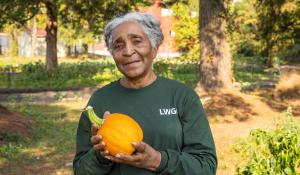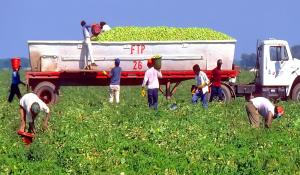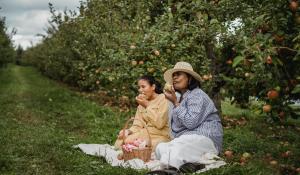
For Osei Doyle and Brendalyn King, one conversation changed everything, taking them on a journey to explore Black Americans’ connection to land.
“We were walking down Myrtle Avenue, and I asked her: ‘What do you want your legacy to be?’”
His question sparked a conversation about their community and what they could do to create a better future. In 2020, it brought them from New York to Salem, Illinois, just east of St. Louis, Missouri, to establish the farm Salem HempKings. On this farm, they grew 200 hemp plants in the first year and plan to increase to 500-600 in 2023. After the harvest, they processed the plant material into products like salves.
The pair joined Green America’s Soil & Climate Alliance (SCA) in 2020, when they “had no idea what soil health was or what it had to do with hemp” after Gabriel Grant, a Green America advisor, asked them to join. Quickly, King says, they learned the importance of community, regenerative agriculture, and “proudly” jumped into work with SCA.
In 2021, Doyle and King expanded their ventures and bought over 244 acres of land around Lake Placid, Missouri, between St. Louis and Kansas City. With big plans for the land, Doyle and King are stepping up as leaders to shift mindsets about our relationship to the land, and who has a right to it.
Take Off Your Shoes and Walk in the Grass
For Doyle, who grew up in Trinidad, surrounded by the lush Caribbean, nature is understood to be essential for an abundant life.
“When I came out to Salem and decided to farm, I felt like I could hear myself for the first time. I think everybody deserves that serenity,” Doyle says.
This serenity, however, is not always accessible to everyone. In the US, people of color are three times likelier to live in “nature-deprived” spaces, according to a 2020 Center for American Progress report.
During the pandemic and following the murders of George Floyd, Breonna Taylor, and other Black people at the hands of police, King recalls white friends leaving home—camping in the mountains, hiking through the desert—for weeks at a time, while many Black Americans had nowhere to heal.
“Our land [in Lake Placid] will be that place where after traumatic events people come and rest and have conversations about it,” she says. “We want people to come to our property so they can ground themselves. Take your shoes off and walk in the grass, touch the soil, work with the land.”
How Land Becomes Reparations
Giving Black Americans the chance and space to reconnect to the land, to heal and grow on it, is one way to support justice for centuries of systemic inequality and brutality.
According to the US Department of Agriculture’s 1910 Census of Agriculture, Black Americans collectively owned 16-19 million acres (about the area of South Carolina) of land—the peak of Black landownership. The most recent census, from 2017, found Black Americans owned only 4.7 million acres (about the area of New Jersey).
In a 2022 study, published in the American Economic Association Papers and Proceedings journal, Dr. Dania Francis determined the value of declining Black-owned acreage between 1920 and 1997. The loss is estimated at $326 billion and affected more than 200,000 Black Americans.
“I think of it as a right to citizenship, especially for those who’ve worked the land,” King said. Centuries of slavery, in which this land was cultivated and developed on the backs and from the lives of Black people, make their land and wealth loss particularly egregious.
King and Doyle purchased the Lake Placid land from previous Black owners, the family of Dr. PC Turner, who originally bought the land in 1934. Turner imagined it as Missouri’s equivalent to “Black Eden,” Idlewild, Michigan—a resort town for Black families founded in 1912 and shuttered in 1964. Their Lake Placid dream, then, is not theirs alone, but that of Black Americans kept from the land that is rightfully and equally theirs.
A New Way to Think About Crops
Growing hemp as their main crop, and using it at the revitalized resort, is an intentional choice.
The once-ubiquitous crop, which colonial farmers were mandated to grow by law, starting with a 1619 Virginia law affecting all farmers in the state, became a political and racist weapon in the 20th century. As regulation, criminalization, and legalization battles waged over cannabis, the plant which hemp and marijuana come from, and Presidents Nixon and Reagan’s wars on drugs targeted Black Americans, incarceration rates soared and remain high today. In 2018, nearly 600,000 Black Americans were arrested for possession, triple the rate of white people, according to a 2020 ACLU report.

One of the couple’s goals is to offer opportunities for people who have experienced incarceration.
“We’ll host them and encourage them to work with us in the hemp industry and on the land,” Doyle explains. “Over time, a reentry program will emerge.”
They plan to educate visitors on cannabis, including misconceptions, and how to grow it regeneratively, use it creatively (like building structures made from hemp on the resort), and overall defy its weaponization by white supremacy.
Even as records for possession are expunged across the nation, King’s indignation with injustice is part of what inspires this work. “It was like, ‘Oops, sorry we’ve jailed you, but good luck out there now,’” she says. “These men and women deserve better.”
And better is what Lake Placid will offer, not just to people experiencing freedom again, but all people who visit, and especially the Black Americans who have been systemically kept from the land their ancestors toiled away on.
A Farming Revolution
Doyle and King don’t believe in doing all this work alone. They plan to start giving presentations to local farm bureaus and converting the mindsets of farmers “stuck on corn and soybeans” to test plots with people of color and different crops like hemp, which boasts regenerative agricultural benefits like bioremediation (introducing microorganisms to help break down environmental pollutants) and carbon sequestration.
“What does it look like for white landowners to have a part in reparations by sharing the land with Black farmers and prioritizing healthy soil?” King asks.
Focusing on new crops, cooperative and regenerative agriculture, and on healthy soil through additions like biochar and carbon substrates, she says, is how to move forward and away from a struggling and harmful industry stuck in the past.
“Can we create a supply chain with justice intertwined?” She wonders. “We can show that farmers care, we can ensure the land is taken care of. It’s all possible.”







